2020高考英语中的省略
- 格式:doc
- 大小:39.00 KB
- 文档页数:7
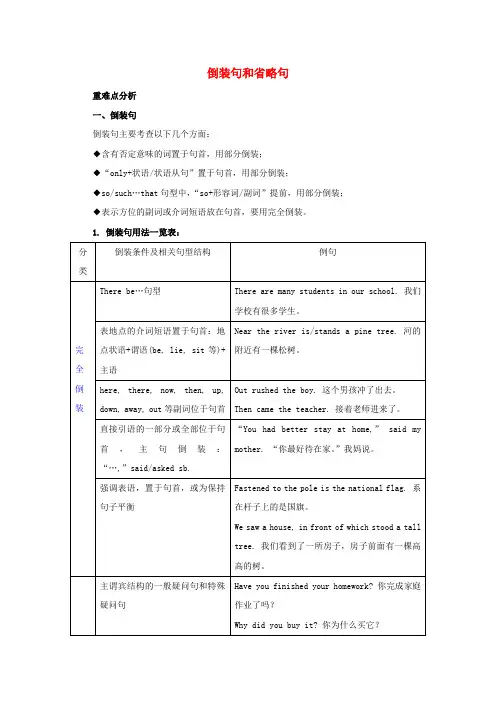
倒装句和省略句重难点分析一、倒装句倒装句主要考查以下几个方面:◆含有否定意味的词置于句首,用部分倒装;◆“only+状语/状语从句”置于句首,用部分倒装;◆so/such…that句型中,“so+形容词/副词”提前,用部分倒装;◆表示方位的副词或介词短语放在句首,要用完全倒装。
1. 倒装句用法一览表:2. 特别提示(1) there be结构的倒装句型中,除了be动词之外,there后还可接lie, live, seemto be等。
如:There lived an old man in the village long long ago. 很久很久以前,村子里住着一位老人。
(2) here, there, now, then, up, down, away, out等副词位于句首,主语为代词时不到装。
如:Away it flew. 它飞走了。
(3) 直接引语的一部分或全部位于句首,主句倒装,主句倒装,但是主语为代词时不倒装。
如:“You have to finish it tonight,” she said. “今晚你必须完成它,”她说。
(4) so位于句首不倒装的情况:① 主语与前句相同,表赞同,译为“确实如此”。
如:— Mike studies hard. 迈克学习很刻苦。
— So he does. 确实是。
② 表示前句内容也适用于另外的人或事,前句如果列举了两种事实以上,用“so it is/was with sb./sth.”回答。
如:— Tom is kind and often helps those in trouble. 汤姆很友好,经常帮助处于困境中的人。
— So it is with his father. 他父亲也是。
(5) 使用as/though进行倒装时注意:①句首有名词,名词不能带任何冠词。
如:Child as he is, he can tell right from wrong. 尽管他是个孩子,却能够明辨是非。
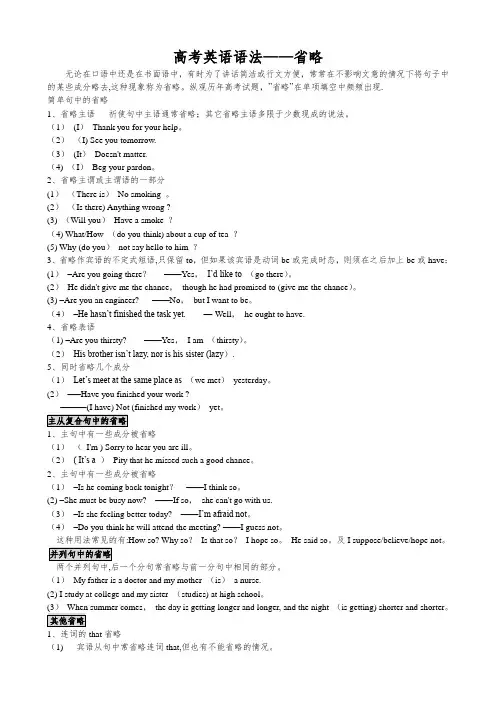
高考英语语法——省略无论在口语中还是在书面语中,有时为了讲话简洁或行文方便,常常在不影响文意的情况下将句子中的某些成分略去,这种现象称为省略。
纵观历年高考试题,”省略”在单项填空中频频出现.简单句中的省略1、省略主语祈使句中主语通常省略;其它省略主语多限于少数现成的说法。
(1)(I)Thank you for your help。
(2)(I) See you tomorrow.(3)(It)Doesn't matter.(4) (I)Beg your pardon。
2、省略主谓或主谓语的一部分(1)(There is)No smoking 。
(2)(Is there) Anything wrong ?(3) (Will you)Have a smoke ?(4) What/How (do you think) about a cup of tea ?(5) Why (do you)not say hello to him ?3、省略作宾语的不定式短语,只保留to,但如果该宾语是动词be或完成时态,则须在之后加上be或have:(1)–Are you going there?——Yes,I’d like to (go there)。
(2)He didn't give me the chance,though he had promised to (give me the chance)。
(3) –Are you an engineer? ——No,but I want to be。
(4)–He hasn’t finished the task yet. —-Well,he ought to have.4、省略表语(1) –Are you thirsty? ——Yes,I am (thirsty)。
(2)His brother isn’t lazy, nor is his sister (lazy).5、同时省略几个成分(1)Let’s meet at the same place as (we met)yesterday。
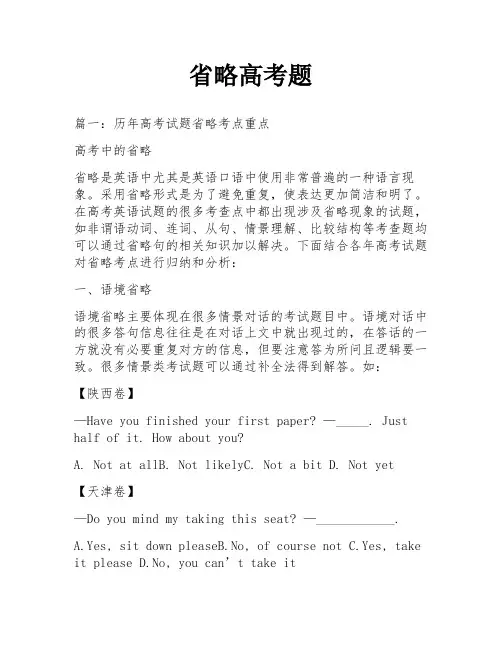
省略高考题篇一:历年高考试题省略考点重点高考中的省略省略是英语中尤其是英语口语中使用非常普遍的一种语言现象。
采用省略形式是为了避免重复,使表达更加简洁和明了。
在高考英语试题的很多考查点中都出现涉及省略现象的试题,如非谓语动词、连词、从句、情景理解、比较结构等考查题均可以通过省略句的相关知识加以解决。
下面结合各年高考试题对省略考点进行归纳和分析:一、语境省略语境省略主要体现在很多情景对话的考试题目中。
语境对话中的很多答句信息往往是在对话上文中就出现过的,在答话的一方就没有必要重复对方的信息,但要注意答为所问且逻辑要一致。
很多情景类考试题可以通过补全法得到解答。
如:【陕西卷】—Have you finished your first paper? —_____. Just half of it. How about you?A. Not at allB. Not likelyC. Not a bitD. Not yet【天津卷】—Do you mind my taking this seat? —____________.A.Yes, sit down pleaseB.No, of course notC.Yes, take it pleaseD.No, you can’t take it二、省略比较结构在上下文含义明了的情况下,有时可以把一些形容词和副词比较结构中的重复信息省略掉,只保留关键信息。
最常见的有省略比较结构中的形容词和副词或比较对象。
如:【07陕西卷】Though he started late, Mr. Guo played the piano as well as, if_____, Miss LiuA. not better thanB. not betterC. no better thanD. better【94全国卷】John plays football ______, if not better than, David.A. as wellB. as well asC. so wellD. so well as【90卷】The pianos in the other shop will be______, but _____ .A. cheaper; not as betterB. more cheap; not as betterC. cheaper; not as goodD. more cheap; not as good三、省略状语从句状语从句的省略也成为高考试题中的考查重心,很多状语从句可以通过省略变成非谓语动词考查题、连词考查题、情景对话考查题等形式,大家解题时要注意此类省略形式。
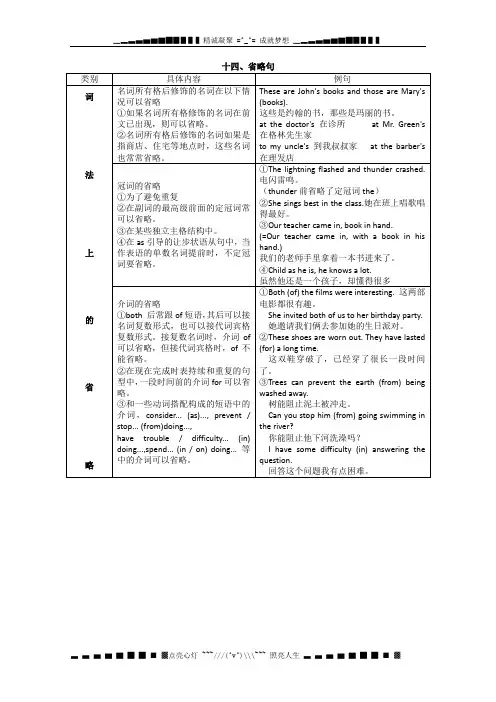
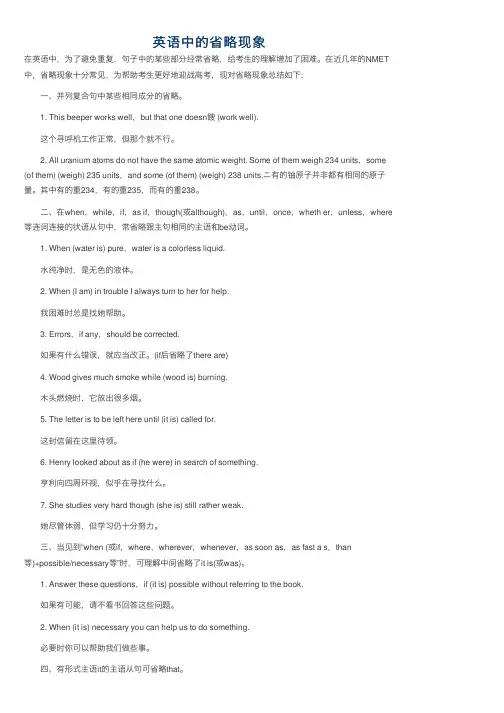
英语中的省略现象在英语中,为了避免重复,句⼦中的某些部分经常省略,给考⽣的理解增加了困难。
在近⼏年的NMET 中,省略现象⼗分常见,为帮助考⽣更好地迎战⾼考,现对省略现象总结如下: ⼀、并列复合句中某些相同成分的省略。
1. This beeper works well,but that one doesn餿 (work well). 这个寻呼机⼯作正常,但那个就不⾏。
2. All uranium atoms do not have the same atomic weight. Some of them weigh 234 units,some (of them) (weigh) 235 units,and some (of them) (weigh) 238 units.ニ有的铀原⼦并⾮都有相同的原⼦量。
其中有的重234,有的重235,⽽有的重238。
⼆、在when,while,if,as if,though(或although),as,until,once,wheth er,unless,where 等连词连接的状语从句中,常省略跟主句相同的主语和be动词。
1. When (water is) pure,water is a colorless liquid. ⽔纯净时,是⽆⾊的液体。
2. When (I am) in trouble I always turn to her for help. 我困难时总是找她帮助。
3. Errors,if any,should be corrected. 如果有什么错误,就应当改正。
(if后省略了there are) 4. Wood gives much smoke while (wood is) burning. ⽊头燃烧时,它放出很多烟。
5. The letter is to be left here until (it is) called for. 这封信留在这⾥待领。
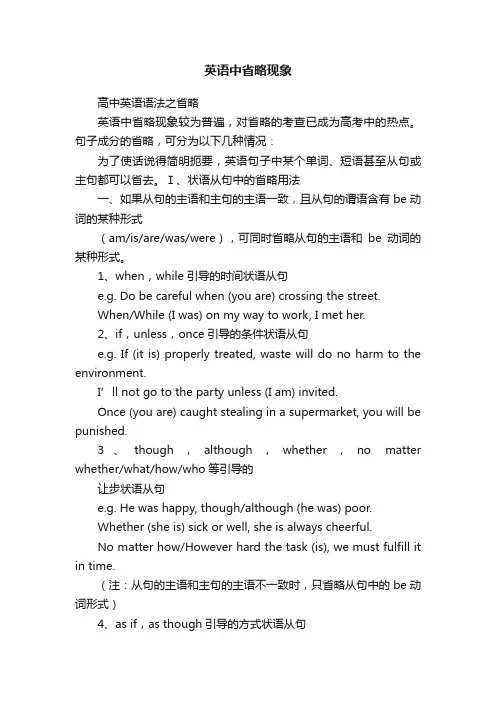
英语中省略现象高中英语语法之省略英语中省略现象较为普遍,对省略的考查已成为高考中的热点。
句子成分的省略,可分为以下几种情况:为了使话说得简明扼要,英语句子中某个单词、短语甚至从句或主句都可以省去。
Ⅰ、状语从句中的省略用法一、如果从句的主语和主句的主语一致,且从句的谓语含有be动词的某种形式(am/is/are/was/were),可同时省略从句的主语和be动词的某种形式。
1、when,while引导的时间状语从句e.g. Do be careful when (you are) crossing the street.When/While (I was) on my way to work, I met her.2、if,unless,once引导的条件状语从句e.g. If (it is) properly treated, waste will do no harm to the environment.I’ll not go to the party unless (I am) invited.Once (you are) caught stealing in a supermarket, you will be punished.3、though,although,whether,no matter whether/what/how/who等引导的让步状语从句e.g. He was happy, though/although (he was) poor.Whether (she is) sick or well, she is always cheerful.No matter how/However hard the task (is), we must fulfill it in time.(注:从句的主语和主句的主语不一致时,只省略从句中的be动词形式)4、as if,as though引导的方式状语从句e.g. He rubbed his eyes and yawned as if/though (he was) waking up after along sleep.He stood up as if/though (he wanted) to leave.(as if/though + to do表示一个将来的动作)二、than,as引导的比较状语从句中的省略用法:当不同的主语进行比较时,一般省略从句中的谓语;当从句中的主语与谓语(be动词除外)和主句中的主语与谓语相同时,通常省略从句中的主语和谓语,只保留比较部分。
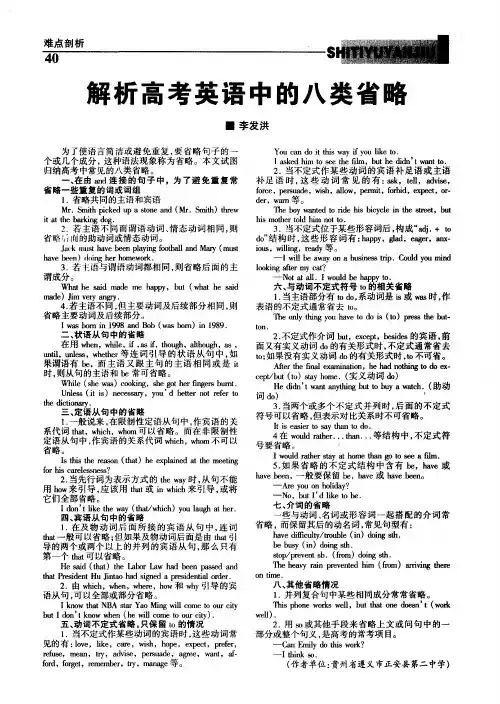
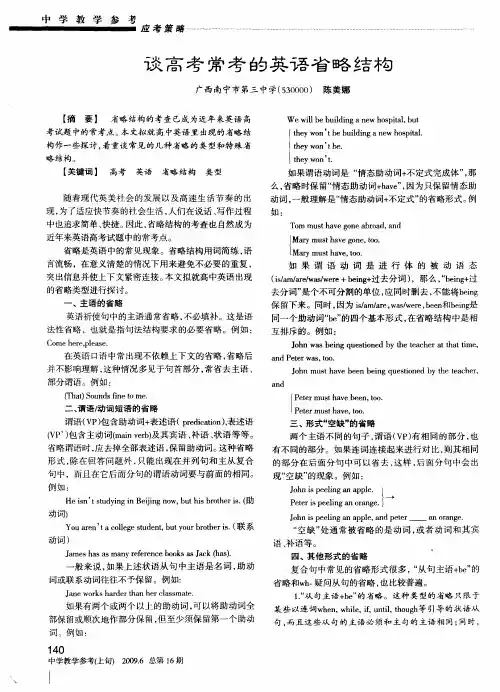
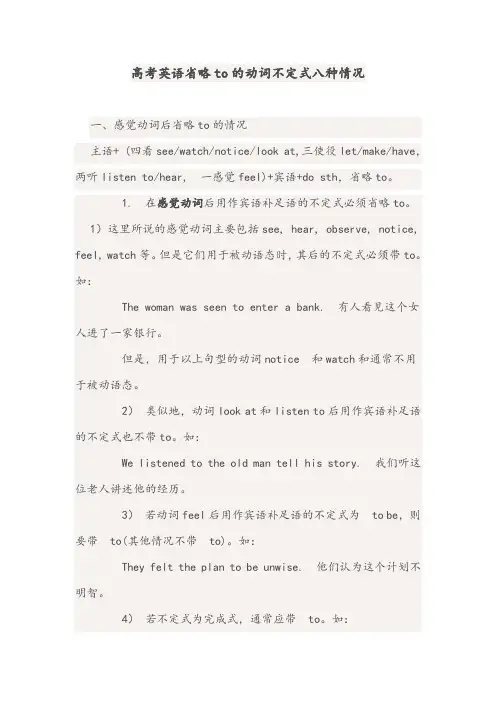
高考英语省略to的动词不定式八种情况一、感觉动词后省略to的情况主语+ (四看see/watch/notice/look at,三使役let/make/have,两听listen to/hear, 一感觉feel)+宾语+do sth,省略to。
1. 在感觉动词后用作宾语补足语的不定式必须省略to。
1)这里所说的感觉动词主要包括see, hear, observe, notice, feel, watch等。
但是它们用于被动语态时,其后的不定式必须带to。
如:The woman was seen to enter a bank. 有人看见这个女人进了一家银行。
但是,用于以上句型的动词notice 和watch和通常不用于被动语态。
2)类似地,动词look at和listen to后用作宾语补足语的不定式也不带to。
如:We listened to the old man tell his story. 我们听这位老人讲述他的经历。
3)若动词feel后用作宾语补足语的不定式为to be,则要带to(其他情况不带to)。
如:They felt the plan to be unwise. 他们认为这个计划不明智。
4)若不定式为完成式,通常应带to。
如:I noticed her to have come early. 我注意到她来得很早。
2. 使役动词后省略to的情况在let, make, have等使役动词后用作宾语补足语的不定式必须省略to。
如:My mother wouldn’t let me go to the film. 我妈妈不会让我去看电影的。
1) 当使役动词用于被动语态时,要补上在主动语态中省略的to(主要是指make,let和have很少用于被动语态)。
2) force, oblige等虽然也表示“使”,但它们后用作宾语补足语的不定式必须带to。
如:He forced me to go with them. 他迫使我同他们一起去。
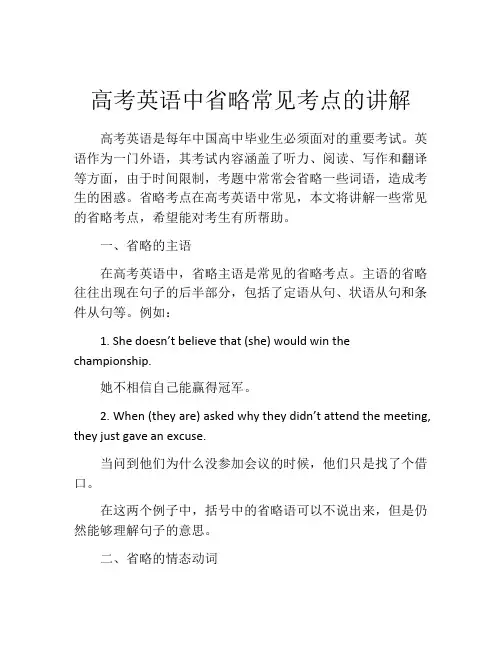
高考英语中省略常见考点的讲解高考英语是每年中国高中毕业生必须面对的重要考试。
英语作为一门外语,其考试内容涵盖了听力、阅读、写作和翻译等方面,由于时间限制,考题中常常会省略一些词语,造成考生的困惑。
省略考点在高考英语中常见,本文将讲解一些常见的省略考点,希望能对考生有所帮助。
一、省略的主语在高考英语中,省略主语是常见的省略考点。
主语的省略往往出现在句子的后半部分,包括了定语从句、状语从句和条件从句等。
例如:1. She doesn’t believe that (she) would win the championship.她不相信自己能赢得冠军。
2. When (they are) asked why they didn’t attend the meeting, they just gave an excuse.当问到他们为什么没参加会议的时候,他们只是找了个借口。
在这两个例子中,括号中的省略语可以不说出来,但是仍然能够理解句子的意思。
二、省略的情态动词情态动词是英语语法中的一种词性,用来表示说话者对某种行为或状态的态度或想法,如can, could, may, might, must, shall, should, will, would等。
考试中,情态动词的省略常见于倒装句和感叹句中。
例如:1. Never before (have) I seen such a beautiful sunset.我之前从未见过如此美的日落。
2. How (can) you be so careless!你怎么能如此粗心!在以上两个句子中,括号中的情态动词可以省略。
在英语语法中,这种省略主要是为了避免重复或突出语气。
三、省略的连词连词在英语语法中用来连接句子或短语。
在高考英语中,常见的省略考点涉及到从属连词的省略,包括了条件句和让步句等。
例如:1. If (it is) rainy, I will stay at home.如果下雨,我会呆在家里。
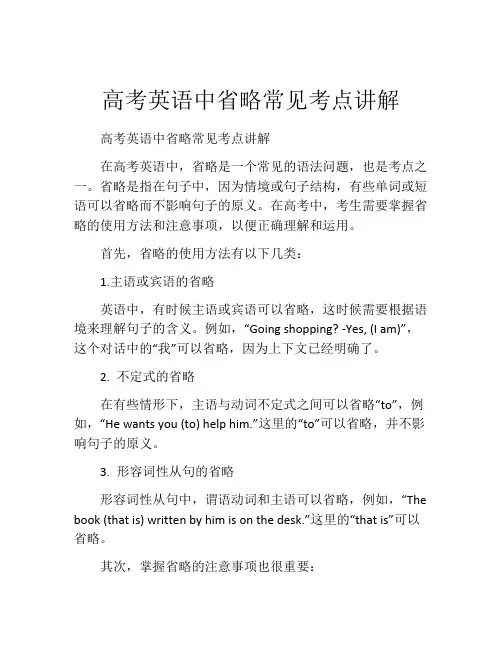
高考英语中省略常见考点讲解高考英语中省略常见考点讲解在高考英语中,省略是一个常见的语法问题,也是考点之一。
省略是指在句子中,因为情境或句子结构,有些单词或短语可以省略而不影响句子的原义。
在高考中,考生需要掌握省略的使用方法和注意事项,以便正确理解和运用。
首先,省略的使用方法有以下几类:1.主语或宾语的省略英语中,有时候主语或宾语可以省略,这时候需要根据语境来理解句子的含义。
例如,“Going shopping? -Yes, (I am)”,这个对话中的“我”可以省略,因为上下文已经明确了。
2. 不定式的省略在有些情形下,主语与动词不定式之间可以省略“to”,例如,“He wants you (to) help him.”这里的“to”可以省略,并不影响句子的原义。
3. 形容词性从句的省略形容词性从句中,谓语动词和主语可以省略,例如,“The book (that is) written by him is on the desk.”这里的“that is”可以省略。
其次,掌握省略的注意事项也很重要:1.根据上下文理解在高考英语中,出现省略的句子往往需要依靠上下文来理解,考生需要仔细阅读上下文,避免对省略造成误解。
2. 不定式的省略最常用在省略中,不定式的省略是最常见的,考生需要掌握不定式的使用方法,才能正确理解和运用省略。
3. 注意省略对句子成分的影响在句子中出现的省略,会影响到句子的成分和语法结构,考生需要仔细分析和理解涉及到的语法问题。
综上所述,省略是高考英语中的一个常见考点,考生需要掌握省略的使用方法和注意事项,以便正确理解和运用。
在备考中,可以通过大量练习和查阅相关资料来提高自己的掌握程度,避免省略造成的误解和错误。
省略句为了使讲话和行文简洁,句中某些成分有时可省略。
省略可分以下几种情况:(一)简单句中的省略1、省略主语:祈使句中主语通常省略。
其它省略主语多限于少数现成的说法。
e.g. (I) Thank you for your help.(括号内为省略的词语,下同)(I) See you tomorrow.(It) Doesn’t matter.2、省略主谓语或主谓语的一部分。
e.g. (There is) No smoking.(Is there) Anything wrong?Why (do you) not say hello to him?3、省略作宾语的不定式短语,只保留to。
e.g. ---- Are you going there?---- I’d like to (go there).He did not give me the chance, though he had promised to (give me the chance).(动词:want, wish, expect, hope, like, love, try, forget, decide,prefer, mean, intend, plan, refuse…等动词宾语。
tell, ask, want, expect, warn…等动词的宾补。
形容词:glad, happy, pleased, delighted, …短语:be going to, be about to, be able to, have to, u sed to, ought to, …)注意:如果该宾语是be动词或完成时态,则须在to之后加上be或have。
e.g. ---- Are you an engineer?---- No, but I want to be.---- He hasn’t finished the task yet.---- Well, he ought to have.4、省略表语。
第四讲特殊句式-- 祈使句、省略句、强调句、倒装句一、改正下列句子中的唯一错误:1.It is your valuable guidance which has enabled me to go around the city without any trouble.【答案】(强调句)which改为that【解析】句意:正是你的宝贵指导使我毫无困难地游览了这座城市。
句中强调主语"your valuable guidance"。
2.It was a year ago when Joshua got a bike, and he rode it every day.【答案】(强调句)when改为that【解析】句意:正是在一年以前Joshua获得了一辆自行车,并且他天都骑着这辆自行车。
这是一个强调句,句中强调了时间状语"a year ago",故把when改为that。
3.Was it in the lake where Mary was saved by a soldier?【答案】(强调句)where改为that【解析】此处强调的是句子的地点状语"in the lake",是强调句的一般疑问句句型:"Was it+被强调部分+that/who+句子的其他部分?”故把where改为that4.It is not how much we learn but how much love we put into what we do which benefits our work most.【答案】(强调句)which改为that【解析】此处表示重要的不是我们学到了多少,而是我们在工作中投入了多少爱对我们的工作最有用。
本句考查强调句,强调句型基本结构:It is/was+被强调部分+that/who+句子的其他部分,本句是对not how much we learn but how much love we put into what we do 的强调,故把which 改为that。
1、在不引起误会的情况下,两个并列名词中的后⼀个名词前的不定冠词可以省略。
如: The noun is the name of a person or thing. 名词是⼈和物的名称。
2、当两个并列名词指的是同⼀个⼈时,后⼀名词前的不定冠词通常省略。
如: His father is a teacher and poet. 他⽗亲是位教师兼诗⼈。
但如果要强调这两种⾝份,也可⽤两个不定冠词。
如: His father is a teacher and a poet. 他⽗亲既是教师,⼜是诗⼈。
有时,由于两个并列的名词关系⽐较紧密、被视为⼀个整体,也可只⽤⼀个冠词。
如: A man and woman are walking arm-in-arm. ⼀对男⼥⼿挽着⼿⾛着。
3、两个形容词并列同时修饰⼀个名词时,若该名词指的是两个事物,则通常应分别使⽤两个冠词。
如: We have a black and a white cat. 我们养了⼀只⿊猫和⼀只⽩猫。
⽐较。
如:We have a black and white cat. 我们养了⼀只⿊⽩花猫。
但是,有时两个并列的名词指⼀个事物,为了加强语⽓,也有了两个冠词。
如: It was a cold and a dark night. 那是⼀个⼜冷⼜⿊的夜晚。
4、有些由两样东西构成的“⾃然成对”使⽤的事物,通常只在其前使⽤⼀个冠词。
如: a knife and fork ⼀副⼑叉 a cup and saucer ⼀副茶杯与茶托 a horse and cart ⼀辆马车 a needle and thread ⼀根带线的针 hire a car and driver 租⼀辆配有司机的汽车 有时连第⼀个冠词也省略(尤其是与介词连⽤时)。
如:with knife and fork ⽤⼑叉 5、当要对两个并列的名词进⾏选择和⽐较⽅⾯的强调时,通常应重复两个冠词。
新高考英语语法专题透析—省略结构一、概念省略句是英语的一种习惯用法。
按照语法的分析,句子应该具备的成分,有时出于修辞上的需要,在句中并不出现,这种句子叫做省略句,这种语法现象称为“省略”。
二、特点虽然省去句子语法构造所需要的组成部分,但仍能表达其完整的意义。
省略形式多样,从单词、短语到分句,都可以省略。
三、简单句中的省略1.省略主语和谓语—Hello! Is Jack in?—(This is)Jack speaking.—How are you?—(I’m)Fine, thank you.2.There be句型中(Is there)Anything else that you want?3.感叹句根据上下文的省略How beautiful(it is)!4.名词所有格后的名词,如果是表示住宅、店铺、教堂或上下文已经暗示或明确指出过的事物时,常省略。
I’m going to the tailor’s(shop).四、并列句中的省略1.如果后面分句中有与前面相同的部分常被省略。
She is not fond of cooking, nor am I(fond of cooking).2.有时并列句中的省略部分出现在前面的分句中时,要看完最后一个分句才能掌握全句的完整意义。
Tom lives(in London), and John works in London.五、复合句中的省略1.宾语从句中的省略(1)由特殊疑问词引导的宾语从句中,若有与前面主句重复的内容,则可将重复内容省略,而只保留特殊疑问词。
You look upset. Can you tell me why?(2)在I think/I believe/I hope/I guess/I’m afraid等作答句,后面跟“so”与“not”分别等于肯定或否定时,宾语从句可省去。
—Do you believe he will pass the exam?—I believe so.(=I believe he will pass the exam.)—Do you think it will snow?—I hope not.(=I hope that it will not snow.)(3)在know/think/consider/suppose/find/believe/say/decide等动词后面所接的宾语从句中,连词that可以省略;若带有多个宾语从句,只有第一个that可以省略,其余的则不能省略。
、论文类样式:《中学教学参考》2011年第10期高考英语试题中“省略”的考查高考英语试题中“省略”的考查。
对省略现象的考查已成为近年来英语高考试题中的常考点。
在新课标(人教版必修5)中还特别设计了省略的专项训练。
省略这种语法手段既可避免重复,又能使上下文更紧密地连接起来,因此,在英语交际中,只要不违反语法结构和引起歧义,就大可使用省略。
一、复合句中的省略现象1. 在含有比较结构的复合句中,常在as或than引导的分句中省略某些与主句相同的成分或省略在特定上下文或特定情景中已知的成分。
如:(NMET 96)How beautifully she sings!I’ve never heard() A.the better voice C.the best voice本题应选D。
从整个语境来分析,后句中的比较状语从句than hers被省略掉了。
故此题应选比较级。
2. 表示时间、条件的状语从句用了主语+be+分词结构,且主句与从句主语一致时,可省略从句的主语和be,形成连接词+过去分词结构。
如:2010(江西卷)The experiment shows that proper amounts of exercise, if( ) regularlyA. being carrying out C. carried out D. to carry此处if 引导省略句,该省略句原句应为“if proper amounts of exercise arecarried out regularly...”根据省略原则,把相同的主语和系动词be省去,就只剩下carried out regularly, 所以选C。
3.在定语从句中的省略。
大部分的定语从句都可以通过省略成为分词作定语,主动语态用现在分词,被动语态用过去分词。
如:A)(NMET 97)The Olympic Games,( )in 776 B.C.,did not include women A.first playing B.to be firstC.first played 本题应选C。
高考中的省略在英语中,有时为了避免结构上或内容上的重复,并使上下文紧密连接;有时因为语法的客观要求,句子中的一个或几个成分不需要表达出来,这种现象称为省略。
英语中的省略要求不破坏语法结构,要保持句子意义的准确无误。
省略有词法上的省略,也有句法上的省略,还有一种替代省略。
省略部分的成分和含义可从上下文或具体语言环境中找到而且是有章可循的,英语的省略大致有以下几种情况:一、简单句中的省略1)感叹句中常省略主语和谓语,如: What a hot day !How wonderful!2)在一些口语中可以省略某些句子成分,如:Anything else ?—Are you feeling better now ? — Much better . This way, please.二、并列句中的省略1)如果主语不同,而谓语动词中的一部分相同,则省略谓语动词中相同的部分,如:John must have been playing basketball and Mary doing her homework. 2)主语相同,谓语动词也相同,则二者都可以省略,如: His advice made John happy, but Mary angry.3)主语相同,而谓语不同,则可以省略主语,如: He gave up drinking for several days, but soon returned to his old ways.4)在并列复合句中,如果that从句从属于第二个并列句且它的谓语动词和宾语等其它一些成分与第一个并列句相同, that从句通常可以省略这些相同的部分,如:Jack will danceat the party, but I know Tom won't .三、复合句中的省略I)名词性从句中的省略(1)作宾语的what从句中的谓语动词与主句的相同,则what从句可以省略谓语,甚至主语,如:Someone has used my bike, but I don't know who .He has gone, but no one knows where.(2)引导宾语从句的连词that在口语中常常省略,或并列的宾语从句中的第一个连词that也能省略,如:He said he had arrived here two days before and that he had lived in a hotel. (3)在某些表虚拟语气的主语从句、宾语从句、表语从句和同位语从句中,从句谓语动词中的助动词should可以省略。
这些句子一般包含如下动词一及其派生词:一个坚持(insist),二个命令(order, command),三建议(suggest, propose, advise ),四要求(demand, require, request, ask) ,如:It's important that we speak to the old politely.Jane's pale face suggested that she was ill and her parents suggested that she have a medical examination.(4) It is necessary(important, impossible, strange, natural, a pity, no wonder) that...主语从句中,如: It is necessary that the problem be solved at once.(5)有时也可以根据说话的情景来省略主句中的一些成分,如: Sorry I've kept you waiting so long.II)定语从句中的省略(1)在限制性定语从句中,作宾语的关系代词that, which, who (whom)常可以省略,如: The man I saw is called Tom.Where is the pen I bought this morning?(2)关系副词when, where, why及that在the time when, the place where, the reason why, the way that结构中引导限制性定语从句时,在非正式场合下,可以省略关系副词when, where, why和that等,如:I shall never forget the day wefirst met.The reason he came so early is his own affair.I don't like the way you speak to yourmother.III)状语从句中的省略(1)当状语从句中的主语和主句的主语一致,或状语从句中的主语是it,并且又含有be动词时,常可以省略从句中的主语和be动词,如:He did as told. Though tired, they went on working.You shouldn't come to his party unless invited.He paused as if expecting her to speak.(2)虚拟条件句中,含助动词,情态动词,动词be或have等,若将它们提到句首,则需省略if,如: Should it rain tomorrow ,we would have to put off the visittill next week.(3)在as(so)... as..., than引导的比较状语从句中,如: I know you can do better than Peter .This car doesn't run as fast as that one .(4)在as引导的让步状语从句中,当作表语的单数名词提前时,不定冠词要省略,如:Child as he is, he knows a lot.四、动词不定式中的省略1)有些动词,如:believe, find, think, feel, consider, imagine, prove等后作宾补的结构to be + n. / adj. 中的to be可以省略,如:I consider him stupid.His mother found him a clever boy.2)感官动词see, hear, feel, watch, notice 等以及使役动词let, make, have后作宾补的动词不定式中的不定式符号to要省略,但变为被动结构时,to必须保留,如:They made the boy go to bed early.The boy was made to go to bed early.3) 动词不定式在like, love, care, want, hope, wish, expect, prefer,refuse, decide, mean, intend, try, promis等动词后作宾语时,为了避免重复,常承前省略不定式后的内容,但要保留不定式符号to,如: I have asked her to come, but she does not want to.---Are you and Jane getting married?---We hope to.注意:want, like用在 when,if ,what,as 引导的从句中,其后的to也常可省略,如:I've decided to do what I like.I'll teach you if you like.I would do it for you, but I don't know how to4)在can not but, can not choose but, do nothing but..., can't help but..., prefer to do rather than do ...., would do... rather than... 之后的动词不定式一般不带to;but之前有实义动词do的某个形式do, does, did, done 而且其宾语是something,nothing,anything和everything等不定代词时,也不带to, 否则要带to,如: We have nothing to do now but wait.I can not but admire his courage.He has no choice but to accept the fact.5)在并列结构中为了避免重复,后一个to省略,如:I'm really puzzled what to think or say.但两个不定式有对照或对比的意义时,则后一个to不能省略,如:I came not to scold but to praise you.6)在why, why not 引导的特殊问句中后跟省略to的动词不定式,如: Why talk so much about it?Why not try it again?7)动词不定式与 be able to, be going to, have to, ought to, used to等构成复合谓语时,不定式结构常可省略,但要保留不定式符号to,如I don’t want to wait for him, but l have to.He doesn’t like fish, but he used to.---Why didn’t you come to our party?---I was going to,but l had a report to write.8)动词不定式中动词原形部分是否省略,主要看句子前面是否已出现过同样的动词。
如果句子前面出现过同样的动词,为了避免重复,句子后面的不定式常省略动词原形,而保留不定式符号to,如:They may go if they wish to.Don't go till I tell you to.9)动词不定式在 ask, warn, tell, advise, force, wish, expect, allow,permit , invite, persuade, order, would like, forbid等动词后作宾语补足语或主语补足语时,常可省略,如:She wants to come, but her parents won't allow her to.Don’t touch anything unless your teacher tells you to.You'd better give a performance if you are asked to.He didn't come, though we had invited him to.10)动词不定式在happy, glad, eager,anxious,willing, ready等形容词等后承前省略动词原形,只保留不定式符号to ,如: ---Will you join me in a walk?---I'll be happy to.I think he should get a job,but you can't force him to if he's not ready to.注:承前省略的动词不定式如果有助动词have或be,则要保留be或have,如:---Are you a doctor? ---No, but I used to be .五、某些词法上的省略1. 名词所有格后修饰的名词在以下情况可以省略1)如果名词所有格修饰的名词在前文已出现,则可以省略,如: These are John's books and those are Mary's .2)名词所有格所修饰的名词,若表示住宅、店铺、教堂或上文已暗示或明确指出过的事物时,常常可以省略。